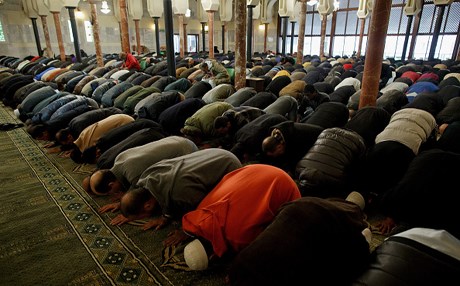SHAFAQNA – Spanish authorities are considering Islamic funerals incompatible with local laws that prohibit corpses being buried in direct contact with the soil.
This issue — and the allocation of more cemeteries for the community — has become imperative for the almost two million Muslims living in Spain.
“The only places in Spain where we are allowed to bury our dead according to our rituals are the regions of Andalucia and the Spanish cities of Ceuta and Melilla (in North Africa),” Riay Tatary, head of the Union of Islamic Communities in Spain, told Rudaw.
While Andalucia has a strong Islamic past, Ceuta and Melilla are two Spanish enclaves disputed by Morocco and with large Muslim populations.
Islamic rituals dictate that the dead should be placed in the grave on the right side of the body, with the head facing Mecca and wrapped only in a shroud – and with no coffin.
The Muslim tradition of burial without a coffin comes from interpretation of this Koranic verse: “From the earth We created you and into it We will return you, and from it We will extract you another time.”
“The Spanish Health Ministry says we are not allowed to bury directly in the soil because of health reasons, but we say that this way it´s better for the environment because a coffin takes a long time to decompose, but a body, no,” added Tatary.
He noted that in Europe Spain stood in a minority with this law. In other parts of Europe, like Belgium or Germany, Muslims are allowed to bury their dead according to their own rituals.
There are 27 cemeteries in Spain where Muslims can rest in peace. Of these, 19 are separate portions of land in Christian cemeteries.
The rest are exclusively Muslim cemeteries, located in Ceuta and Melilla and in Fuengirola, a town near the southern city of Malaga.
When progressive Madrid Mayor Manuela Carmona recently requested 10,000 square meters allocated to Muslims in a cemetery in the Spanish capital, the answer from the central government was “No.” The reason was that bureaucrats considered Islamic burial rituals as illegitimate.
“The Muslim community signed an agreement in 1992 with the Spanish government to allocate some cemeteries for Muslims. In Madrid there are 300,000 Muslims and they don´t have a cemetery, that´s why I got in touch with Ms. Carmona,” said Tatary.
“Our ambition is to be able to have a cemetery in each autonomous region to attend to the needs of the almost two million Muslims who live in Spain,” he said.
In the Madrid region, the only Muslim cemetery was in the town of Griñon. But in 2014, the cemetery passed from the hands of the Ministry of Defence to the local council; it now has to apply the laws dictated by the Ministry of Health.
For more than 70 years many Muslims from around Spain used to be buried in Griñon because it allowed the burial without a coffin and at a minimum cost. The cemetery was built during the Spanish Civil War for Moroccan troops fighting for the forces of General Francisco Franco.
Spanish university professor of law and religions, José Luis Llaquet, told Rudaw that many Muslim residents in Spain take the decision to repatriate the bodies of their loved ones because of the lack of laws supporting their rituals.
Tatary also pointed out that, because of the expenses of burial in Spain, many Muslims prefer to repatriate the bodies of their loved ones. “But new generations prefer to have the parents buried here,” he said.
“We pay 2,000 euros for 10 years for a tomb in Griñon. To send the body somewhere else takes between 1,200 and 1,600 euros,” he said.
Llaquet pointed out that Muslim rituals do not conform with Western practices of waiting 24 hours after death before burial. Muslims believe that the dead should be buried as soon as possible.
Faced with local laws, many Muslims are forced to compromise on their religious beliefs and accept a coffin. But they insist on the coffin being filled with soil, according to Llaquet.
“Some companies specialize in this sector. They opt for the formula of making the bottom part of the coffin with a very flimsy material, which they break at the moment of burial, so that the head could touch the soil,” Llaquet added.
Muslim tradition to bury without the coffin comes from an interpretation from the Koran, the Muslim holy book, which says “From the earth We created you, and into it We will return you, and from it We will extract you another time.”


